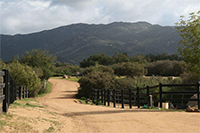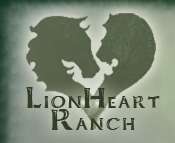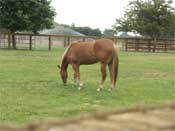| |
| Sponsors |
| |

Ortega Mountain Ranch
Exclusive holistic private ranch offering full service natural style retirement and lay-up boarding. We give your horse daily hands-on attention. Large open paddocks and natural terrain turnout pasture allow your horse room to exercise. We treat your horse as if he were our own.
We are located in the Ortega Mountains between San Juan Capistrano and Lake Elsinore.
ortegamtnranch@cox.net
Please visit our website for more information
www.ortegamountainranch.com
|
 |
LionHeart Ranch |
Premiere Full-Care Equestrian Facility / Boarding / Training / Lessons / Clinics / Holistic Bodywork & Customized Equine Nutrition Programs / Nationally-recognized Equine Therapy Program
3582 Triunfo Canyon Rd, Agoura Hills, CA 91301
818-865-0118, FAX 818-865-0112
www.lionheartranch.com
|
 |
Amity Farm
Every Horse Wants to Live in the Santa Ynez Valley |
Amity Farm is a very private security gated equestrian property which accepts a limited number of retired horses, horses in need of long term lay-up/rehabilitation, and broodmares.
Each resident has an individual paddock with generous shelter or stall with attached paddock which allows for customized care and feeding. Turnout on irrigated grass pastures is provided daily. Super premium orchard grass/timothy is feed twice daily. Alfalfa is available on request. Equine senior, horse ration, broodmare mix, or owner supplied supplement is fed once daily. Fresh well water is always available.
The owner, who has over twenty five years of experience breeding and raising Holsteiners, lives on the property. The farm manager who also lives on Amity Farm has been here over twenty years. We specialize in providing the tranquil and interesting environment your horse deserves.
Call Cathie McHenry 805-688-5686
cathie@hwy246.net
"Amity Farm" - Click here to read more
|
|
Worthy Soles Horse Retirement |
|
Worthy Soles Horse Retirement is a new 20-acre private ranch offering active retirement boarding in Tehachapi, California. Daily care provided by on-site owner. Call or email for details and to discuss your situation.
Tehachapi, CA 93561
Phone: 310-721-2662
cathy@worthysoles.com
www.worthysoleshorseretirement.com/
|

Cole Ranch
This historic sixty-year-old farm has been lovingly run by Steve and Dana Cole for the past two decades.
With 10 expansive, lush pastures, pristine barns, a three-and-five-eights-mile exercise track, round pens, a full-size arena, and twenty-four-hour vet care, we welcome all breeds at a fixed, affordable rate. Horse transportation arranged upon request.
- Our experienced team provides dedicated, tailored attention for each horse's well-being.
- Diligent daily observation, preventative care (vaccinations, deworming, hoof care) and swift action for any health concerns.
Contact us today to schedule a visit.
24010 Avenue 100, Terra Bella, CA 93270
|
| |
| |
| Under the Angels Wings Rescue |
| Horse Rescue / Rehabilitation |
| PO Box 293683, Phelan, CA 92329-3683. 951-318-2275 |
info@uawr.com |
www.uawr.com |
|
| Sunset Equine Farms |
Boarding / Training / Sales / Rehab / Lay-up Facility / European Walker / Theraputic Treatments |
| 9738 Helen Avenue, Shadow Hills, CA 91040. 818-352-3077 |
|
|
| Southern California Equine Rehabilitation Center |
| Rehabilitation / Lay up / Conditioning / Alternative therapys |
| 9301 W. Los Angeles Avenue, Moorpark, CA 93021. 805-553-9701 |
|
|
| The Golden Carrot |
| Rescue / Retirement / Sanctuary |
| 44700 Tule Canyon Road, Anza, CA 92539. 951-763-0800 |
|
|
|
| The Natural Horseman |
| Retirement / Layups / Vacation Boarding / Barefoot Trimming / Therapeutic / Function / Correction |
| Buzz Evans. 47700 Centennial Street, Aguanga, CA 92536. 949-254-3328 |
|
|
| Heavenly Acres Ranch |
| Boarding / Layups / Retirement |
| 12427 Bosley Lane, Corona, CA 92883. 714-401-1850 |
|
|
| Spirit Dancer Ranch |
| Boarding / Lessons / English / Western / Training / Rehabilitation |
| 6397 Gabbert Road, Moorpark, CA 93021. 805-529-7983 |
|
|
| EquiFit Equine Services, LLC |
| Boarding / Rehabilitation Center |
| 6338 West Lilac Road, Bonsall, CA 92003. 760-521-6040 |
|
|
| Dunroven Ranch |
| Dunroven Ranch in Central California providing horse retirement, founder and laminitis rehabilitation, layup, natural hoof care, horse boarding. |
| 51090 Eshom Valley Drive, Badger, CA 93603. 559-337-1080 |
|
|
|
| Heritage Valley Equestrian |
| Boarding / Lay-ups / Retirement |
| 1293 Goodenough Road, Fillmore, CA 93015. 805-746-4311 |
|
|
| Shadow Country Ranch & Horses Care |
| Breeder / AQHA / Buckskin / Dun / Rescue / Rehab / |
| Acton, CA 93510. 661-992-8646 |
|
|
| The Equine Center |
| Veterinary Care / Reproduction / Surgery / Boarding / Layups / Rehab |
| San Luis Obispo, CA 93401. 805-541-6367 |
|
|
|
| Rancho Saguaro |
| Boarding / Lessons / Training / Sales / Kids Camps / Rehab / Layup / Hunter / Jumper |
| 1050 Pereira Road, Martinez, CA 94553. 925-372-5867 |
|
|
|
| Dude's Ranch Equine Rescue Center |
| Boarding / Lessons / Riding Tours / Rescue / Rehab / Sales |
| Los Angeles, CA. 661-269-2473 or 818-497-7468 |
info@dudesranch.com
|
|
| Lincourt Stables |
| Boarding / Lessons / Training / Hunt Seat Equitation / Jumpers / Dressage / Sales / Layups |
| 3919 Rigali Street, Los Angeles, CA 90039. 818-822-0881 |
|
|
| Equi-Touch Equine Rehabilitation |
| Rehabilitation |
| South Gate, CA 90280. 562-235-9373 |
|
|
|
| Camarillo Springs Ranch |
| Boarding / Lessons / Retirement Pasture |
| 202 Camarillo Grove Road, Camarillo Springs, CA 93012. 805-383-3633 |
|
|
| SuzGus All Around Horses |
| Boarding / Breeder / AQHA / APHA / Sales / Retirement / Rehabilitation |
| 30032 Mapes Road, Homeland, CA 92548. 951-926-7282 |
|
|
| BIG Heart Ranch |
| Equine Therapy / Equine Assisted Psychotherapy |
| P.O. Box 1003, Malibu, CA 90265 |
|
|
| Runaway Creek Equine Sports Therapy & Rehabilitation |
| Boarding / Layups / Rehab / Breeder / Training / Working Cow Horse / Cutting / Reining / Horse Sales |
| 24180 Juniper Flats Road, Homeland, CA 92548. 951-966-7689 |
|
|
|
| Rebel D Ranch |
| Boarding / Retirement Facility |
| 1830 Olive Street, Ramona, CA 92065. 760-560-7557 |
|
|
| Pepper Creek Equine Center |
| Boarding / Lessons / Training / Lay-ups |
| 385 Creelman Lane, Ramona, CA 92065. 760-788-1795 |
|
|
|
| Horse Haven |
| Boarding / Retirement |
| PO Box 28, New Cuyama, CA 93254. 661-331-1189 |
|
|
| Lifesavers Wild Horse Rescue |
| Lessons / Sales / Rescue |
| 23809 Easy Avenue J, Lancaster, CA 93535. 661-727-1205 |
|
|
| Horses for Love |
| Tees & Tanks / Acuscope / Camps / Rescue / Rehab |
| 20 Las Plumas, Rancho Santa Margarita, CA 92688. 949-292-1191 |
|
|
|
| Double J Farms Equine Rehabilitation |
| Boarding / Breeder / Warmblood / AQHA / Sales / Reproduction Services / Rehab / Transportation |
| 30529 Alta Mesa Drive, Valley Center, CA 92082. 760-297-0704 |
|
|
| Golden Stirrups Stables |
| Boarding / Lessons / Training / Hunter / Jumper / Dressage / Western Pleasure / Lay-Ups / Overnight Accomodations |
| Aqua Dulce, CA 93510. 661-269-1300 |
|
|
| Whispering Winds Retirement Ranch |
| Boarding / Retirement |
| 1023 Country Club Drive, Escondido, CA 92029. 760-738-8822 |
|
HoundsToHorses@aol.com
|
|
| Northstar Ranch |
| Boarding / Breeder / Sales / Hunter / Jumper / Dutch Warmbloods / Oldenburg / Lay-Ups / Retirement / Mare Care |
| 61570 Highway 74, Mountain Center, CA 92561. 951-659-6356 |
|
northstarranch@earthlink.net
|
|
| Corral of Comfort
Horse Rescue Inc |
| Lessons / Training / Sales / Rescue & Rehabilitation / Non-profit horse rescue dedicated to rehabilitating horses and placing them into new homes. |
| 36180 Valley Springs Rd, Palmdale, CA 93550. 661-361-9188 |
|
|
|
| Giddings Horse Rescue |
| Boarding / Sales / Trail, show, all around / LOTS of GREAT horses available! |
| 21725 John St., Perris CA 92570 Phone: 951-295-8114 |
|
|
| Premier Equine Center |
| Equine Rehabilitation / Cold Salt Hydrotherapy Spa / P3 Electromagnetic Machine / Covered Eurociser Equine Massage / Body Work |
| 16206 Hwy 108 , Jamestown , CA, 95327. 209-602-8702 |
|
|
| InterVision Equine Services |
| Health Care / Rehabilitation / Equine Physiotherapy / Import/Export / TB consult |
| Serving Southern Califorina, CA 92075. 310-995-9339 |
|
gallopout@gmail.com
|
|
| The Yard Equine Center |
| Boarding / Lessons / Training / Breeder / Sales / Rehabilitation Retirement |
| 270 Browns Valley Road, Paicines, CA 95043. 831-628-0801. |
|
|
|
| Perham Ranch |
| Boarding / Speciality and PostOp Care / Full Service Lay-up Rehabilitation Specializing in Soft Tissue Rehab / Platelet Rich Plasma / IRAP Breeding Services Transportation |
| 8135 Sloughhouse Road, Elk Grove, CA 95624. 916-682-7730. |
|
|
|
| Cherry Hill Farm |
| Boarding / Lessons / Training / Hunter / Jumper / Dressage / Rehabilitation |
25392 Davis Ranch Rd, Santa Ysabel, CA 92070. 760-207-2680 |
|
maxtoby@wildblue.net
|
|
| So Cal Equine Sports Medicine |
| Equine Sports Massage / Acupressure Specializing in Lameness / Recuperative Care |
| 19502 Rancho Ballena Rd., Ramona, CA 92065. 760-315-3064 |
|
equinesports@hotmail.com
|
|
| The Care Barn |
| Vet advised protocals / Horse care service / Day care |
| Orange, CA 92868. 714-289-1701 |
|
lkunzman@sbcglobal.net
|
|
|
| Buckley Stables |
| Boarding / Lessons / Lay-ups |
| 4785 Vachell Lane, San Luis Obispo, CA 93401. 805-540-8288
|
|
|
| Zacharosa Farms |
| Boarding, Lessons, Training, Sales, Kids Camps, Health Care, Retirement & Rehabilitation |
| 1700 Decker Canyon Rd, Malibu CA 90265 310-457-4476 |
|
|
| Animal Rehabilitation |
| Rehab / Massage |
| Tanya Doman, PT, CESMT. Orange County, CA 92677. |
|
|
|
| Precision Jumpers |
| Boarding/ Lessons/ Training/ Sales/ Health Care/ Hunters/ Jumpers/ Reiki and vibrational medicines/ therapies/ Equine Rehabilitation |
| 1801 Stallion Drive, Santa Ynez, CA 93460 |
|
|
| Saffyre Sanctuary, Inc. |
| Arabians/Thoroughbreds/ Rescue/Rehabilitation/ Retirement |
| P.O. Box 921708 Sylmar CA 91392 Phone: 818-842-4368 |
|
|
|
| Double S Animal Rescue & Sanctuary, Inc. |
| Rehabilitation/ Retirement |
| (Warner Springs - San Diego County) CA 92086 Phone: 619-592-2696 |
|
info@double-s-animal-rescue.org
|
|
| The Second Race |
Retired Race Horses / Thoroughbred / Quarter Horse
We are a national network for ex-race horses and those bred to race. We find homes/new careers for race horses off the track. |
| 122-A E. Foothill Blvd # 300 Arcadia CA 91006 Phone: 626-733-3815 |
|
thesecondrace@gmail.com
|
|
www.thesecondrace.com
|
|
| Swede Equine |
| Boarding / Lessons / Training / Sales / Imported European Sporthorses / Health Care / Jumper / Hunter / Equitation / Dressage / Rehab / Grass Pastures / PEMF Therapy |
| North County San Diego, CA. 805-358-8889 or 760-736-4390 |
|
|
| Equine Hydro-T |
| Hydrotherapy / Rehabilitation |
| 2045 Pacheco Pass Gilroy,CA 95020 Phone: 408-427-6179 |
|
|
| Foresee Horse Company |
| Category: Lessons / Training / Sales / Kids Camps / Western, Hunt Seat, Dressage / Rehabilitation and Lay Ups |
| 1299 Tierra Rejada, Simi Valley, CA 93065 Phone: 805-529-8848 |
|
|
| Eclipse Equine Sports Therapy Center |
| Training / Health Care / Rehabilitation / Lay-up/Retirement |
| 5378 Monterey Road, Paso Robles, CA 93446 Phone: 805-769-6685 |
|
horserehab@gmail.com
|
|
| Saddle Creek Farm |
| Horse retirement/ Equine boarding/ Rehabilitation/ Lay-up/ Foaling Farm |
| 39948 De Luz Road, Fallbrook, CA 92028 760-728-6166 |
|
info@saddlecreekfarm.com
|
|
www.saddlecreekfarm.com
|
|
| Murray's Equine Services |
| Senior Horse Caretaking |
| 25200 Trabuco Road, Lake Forest, CA 92630 Phone: 949-683-9450 |
|
murraysequine@gmail.com
|
|
www.murraysequine.com
|
|
| D&Z Equestrian Stables |
| Boarding / Lessons / Training / Sales / Kids Camps / Health Care / Hunters, jumpers, cross country, western, all around. Layup and daily care. Show barn. Camping trips and more. |
| 4100 Big Tujunga Canyon Rd., Big Tujunga, CA 91042 Phone: 818-223-1062 |
|
Dzequestrian@gmail.com
|
|
www.dzequestrian.com
|
|
| Club Mead Equine Retirement |
| Boarding / Retirement |
| 2931 English Place, Chino Hills CA 91709 Phone: 909-627-5227 |
|
chinoHillshorseboarding@gmail.com
|
|
| Twilight Farms |
| Boarding / Retirement Boarding |
| Anza, CA 92539 Phone: 951-440-4901 |
|
twilightfarms13@gmail.com
|
|
| Sue Briles Stables |
| Boarding / Kids Camps / Retirement / Care Packages |
| 3852 Cazador lane, Fallbrook CA 92028 |
|
| T n C Ranch |
| Boarding / Lessons / Training / Breeder / Kids Camps / Health Care / lay-ups and foaling / retirement |
| 16463 Lost Cyn Rd, Santa Clarita, CA 91387 Phone: 818-355-7983 |
|
tomheavytow@aol.com
|
|
| Blue Pearl Project at Oak Meadows Ranch Horse Rescue |
| Lessons / Training / Sales / Kids Camps / Rental Stable / Horse Rescue & Sanctuary |
| 23690 Bundy Canyon Rd., Wildomar, CA 92595 Phone: 951-805-7419 |
|
bluepearlproject@gmail.com
|
|
www.OakMeadowsRanch.com
|
|
| Fairway Farms |
| Boarding / Training / Breeder / Foaling, Breeding, Lay-ups, Rehab |
| 42250 Terwilliger Rd, Anza, CA 92539 Phone: 951-719-7319 |
|
fairwayfarm14@gmail.com
|
|
| Hummingbird Hill Stables |
| Lay-ups, Rehab |
| 2249 Mardavido Place, Fallbrook, CA 92028 Phone: 760-468-7673 |
|
|
| Rhinestar Performance Horses Natural Horsemanship |
| Boarding / Lessons/ Training/ Groundwork/ Western Pleasure/ all around/ youth / Natural Horsemanship, Western Pleasure, Hunter Undersaddle, all around and trail. Rehab horses mentally and physically. |
| 321 E. La Loma Ave. Ventura County, CA Phone: 805-727-0670 |
|
|
| Rancho Si Como No |
| Boarding / Retirement |
| PO Box 179, Los Olivos, Santa Barbara CA 93460 Phone: 805-686-8384 |
|
klinfoot1@gmail.com
|
|
| Oakridge Farm |
| Boarding/ Training/ Sales/ Dressage/ Retirement/ Breeder |
| PO box 675727 Rancho Santa Fe CA 92067 Phone: 619 813 4882 |
|
jacqui@oakridgefarmrsf.com
|
|
| |
| |
You Can Post a FREE Business Listing Here! |
| |
|

